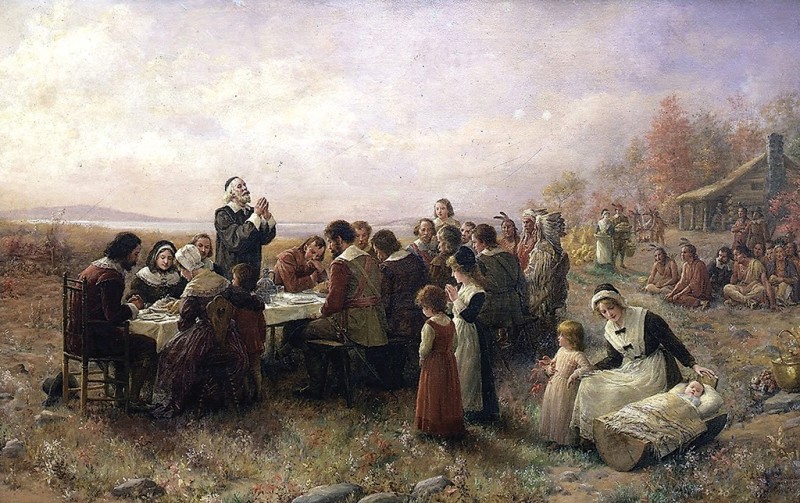 Another Stereotype of the Month entry:
Another Stereotype of the Month entry:
 Another Stereotype of the Month entry:
Another Stereotype of the Month entry:
From the Indianapolis Star, 11/18/06:
book review: Dean George
No need to apologize for Thanksgiving myths
No American holiday better symbolizes our national character than Thanksgiving. While the Fourth of July celebrates America's proud spirit of independence, democracy and patriotism, Thanksgiving is a spiritual holiday commemorating gratefulness for our prosperity, freedom and collective thankfulness to a beneficent God.
A Great and Godly Adventure — The Pilgrims and the Myth of the First Thanksgiving
Author: Godfrey Hodgson
Publisher: PublicAffairs
Price: $22.00
Like many historic events, our shared views of Thanksgiving are seasoned with indelible images: the Mayflower landing at Plymouth Rock, Pilgrims and Indians feasting together shortly after the Pilgrims' arrival, plates piled high with turkey and pumpkin pie.
Wrong, says British author Godfrey Hodgson in " Great and Godly Adventure."
"Thanksgiving is one of the most innocent and happiest of American traditions," Hodgson writes. "There is absolutely no harm in that, but it is a prime example of what historians have come to call 'the invention of tradition.' "
Forget that it's a Brit writing about a beloved American holiday, not to mention the irony that a native of the country that persecuted the Pilgrim Fathers would dare to clarify our understanding of those historic events. Nevertheless, Hodgson has done us a favor, but not before impishly smearing our Thanksgiving myth with sweet potatoes and pumpkin pie to the face, neither of which was present at the first Thanksgiving, he notes.
Even worse, he tells us that turkey couldn't have been served because the Pilgrims' heavy matchlock muskets simply were no match for the few wild turkeys inhabiting eastern Massachusetts at that time. It was, he tells us, the Wampanoag Indians that produced the main course of venison. The last (turkey in the) straw was noting that the Pilgrim Fathers didn't call themselves Pilgrims, nor were they Puritans in the strict sense of the word; they referred to themselves as Englishmen.
"The companions who splashed ashore through the freezing waters of Provincetown Bay had no grandiose plans. Theirs was, from one point of view, a modest enterprise. They set about no more than building a village, and what mattered to them was that they were gathering together a church, their church," Hodgson says.
Hodgson displays a historian's thoroughness when portraying the Thanksgiving story against the earlier European backdrop of the Reformation, the Separatists fleeing England for Holland due to persecution by the Church of England, and finally the perilous four-month trans-Atlantic journey begun in Delfshaven, Holland, and concluding in the historic December 1620 landing in the midst of a snowstorm.
And that was just the beginning of the "planters'" struggles, as by January half of the village population was in the grip of an epidemic (likely pneumonia, poor diet and exposure) that eventually killed 44 of the original 100 settlers. (Six others died within days of landing.)
As the remaining settlers perched precariously on the edge of the continent fought starvation and illness, they didn't realize that surrounding tribes like the Wampanoags, Pamunkeys, Ninnimissinuoks and Massachusetts were all but decimated by various European epidemics over a three-year period shortly before the English arrived. Only the Narrangansett tribe was able to weather the crises, and it was their efforts to seize the weakened Wampanoags' territory that led Samoset and Squanto to befriend and seek an alliance with the Plymouth settlers — prompting probably the most famous dinner invitation in history.
Hodgson also inserts cameo appearances by Myles Standish, known as "Captain Shrimp" due to his small stature; William Bradford and William Brewster, early leaders of the Plymouth colony and signers of the Mayflower Compact; and colorful characters like Adventurer Thomas Weston, Isaac Allerton, and the un-Pilgrim-like scallywag Thomas Morton.
He concludes his fine historical account by recalling the cherished imprints left by Presidents Washington and Lincoln on the annual harvest observance, and a poetic acknowledgment that while Thanksgiving today is drastically different from four centuries ago, it remains a universally breathtaking and important story.
"One can deconstruct the idea of Thanksgiving as much as one likes," Hodgson says. "It remains as a domestic celebration of gratitude, humility, and inclusiveness. These are not qualities for which anyone need apologize."
George, of Brown County, is co-founder of Harris-George.com.
Copyright 2006 IndyStar.com. All rights reserved
Rob's reply
Hodgson's view of Thanksgiving is stereotypical—a whitewash of the holiday's negative implications. The Indians had no reason to be grateful. The Pilgrims were hardly humble, since they considered their colony a shining "city upon a hill." They included the Indians only so long as the Indians were friendly and helpful; then they started killing them.
See Ten Little Pilgrims and Indians for the full story on Thanksgiving.
|
. . . |

|
All material © copyright its original owners, except where noted.
Original text and pictures © copyright 2007 by Robert Schmidt.
Copyrighted material is posted under the Fair Use provision of the Copyright Act,
which allows copying for nonprofit educational uses including criticism and commentary.
Comments sent to the publisher become the property of Blue Corn Comics
and may be used in other postings without permission.